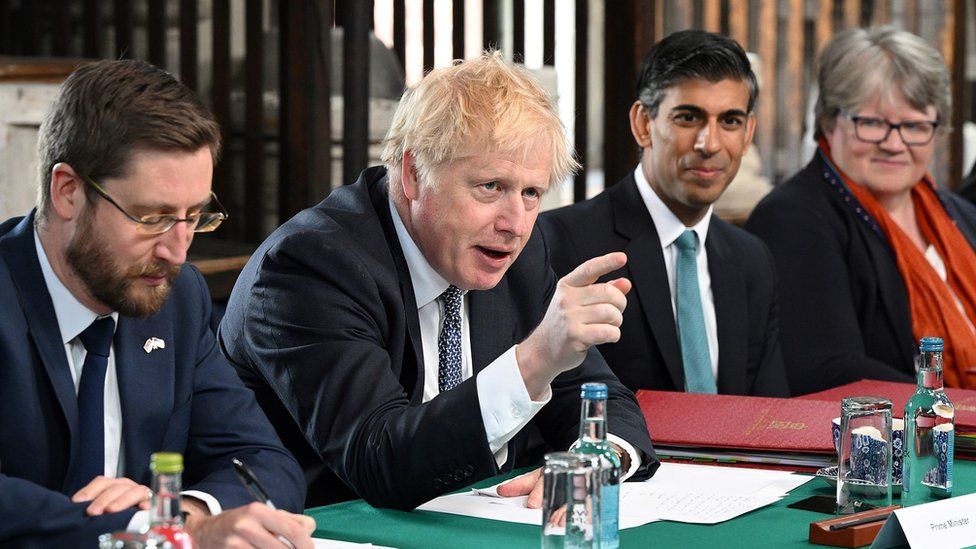BBC News 13 May 2022 - by Joseph Lee
The government wants to cut up to 91,000 civil service jobs to save money, the UK's top civil servant says.
The aim is to return to 2016 staffing levels within three years, Cabinet Secretary Simon Case said in a letter to civil servants seen by the BBC.
Cabinet Office minister Jacob Rees-Mogg said a suggested £3.75bn annual saving was "realistic".
Mr Case, in the letter to civil servants on Thursday night, acknowledged the job cuts would be "challenging" and that civil service staffing had grown "substantially" since 2016, partly because of the pandemic.
"We must consider how we can streamline our workforce and equip ourselves with the skills we need to be an even more effective, lean and innovative service that continues to deliver for the people we serve," he wrote.
The cabinet secretary added the prime minister believed "this matters all the more at a time when the government is focused on controlling expenditure and delivering the best possible value for taxpayers in challenging circumstances".
Mr Rees-Mogg - the minister in charge of efficiency - told the BBC the government needed to have "control of budgets" and ensure efficiency during the cost of living crisis.
He said: "It's not a question of doing less of, it's doing things more efficiently.
"We've taken on quite a number of additional staff - indeed 91,000 - to deal with Covid and some of the consequences of Brexit.
"Those two issues are now fading therefore we can get back to the numbers we previously had."
Mr Rees-Mogg said the government did not need "duplication" and it was hoped "natural departures" would be the basis of most of the cuts.
He would not be drawn on what the freed-up cash would be spent on, saying it was up to Chancellor Rishi Sunak to decide.
At an away day in Stoke-on-Trent on Thursday, the prime minister gave ministers a month to produce plans to drastically shrink the civil service, as the government comes under increasing pressure over the rising cost of living.
Mr Johnson told the Daily Mail: "We have got to cut the cost of government to reduce the cost of living."
Mr Rees-Mogg would not be drawn on which departments could face cuts. He said that secretaries of states and quangos - organisations funded by taxpayers but not controlled directly by government - were responsible for the resourcing of their own departments.
There were 384,000 civil servants employed in 2016 - the lowest number since World War Two - but as the UK prepared to leave the EU, numbers steadily rose until they reached 475,000 at the end of last year.
While large-scale job cuts are likely to take time, a government source said "instant savings" could be achieved by imposing a recruitment freeze in Whitehall and abolishing any vacancies which had not been signed off by a minister.
Examples include the passport office and 70 staff said to be still working on climate change conference COP26.
A source said the cuts were "not ideological" but about "good housekeeping".
The prime minister suggested to the Daily Mail that the savings could be used for tax cuts, saying: "Every pound the government pre-empts from the taxpayer is money they can spend on their own priorities, on their own lives."
But civil service union the FDA said the expansion of Whitehall since 2016 had been necessary to tackle "two unprecedented events", Brexit and the Covid-19 pandemic.
FDA general secretary Dave Penman said the government could decide to cut the civil service back to 2016 levels, but he said it would also have to choose "what the reduced civil service will no longer have the capacity to do" which may affect services such as passports, border control or health.
"Without an accompanying strategy, these cuts appear more like a continuation of the government's civil service culture wars - or even worse, ill-thought out, rushed job slashes that won't lead to a more cost-effective government," he said.
Major job reductions through natural wastage - waiting for people to resign or retire rather than enforcing redundancies - would take many years, Mr Penman warned.
Labour accused the government of "pointless rhetoric and lack of action" instead of implementing an emergency budget to offer more support to people struggling with bills.
A government spokesperson said that the prime minister and ministers were "clear that the civil service does an outstanding job delivering for the public and driving progress on the government's priorities".
But they added when people are facing rising costs, they "rightly expect their government to lead by example and run as efficiently as possible".

